Reference Letter From Professor
[Your Name]
[Your Title/Position]
[Your Institution]
[Your Address]
[City, State, Zip Code]
[Email Address]
[Phone Number]
[Date]
[Recipient's Name]
[Recipient's Title/Position]
[Recipient's Institution/Company]
[Recipient's Address]
[City, State, Zip Code]
Dear [Recipient's Name],
I am writing this letter to wholeheartedly recommend [Student's Name] for [purpose of the reference letter - e.g., academic program, job application, scholarship, etc.]. I have had the privilege of mentoring and teaching [him/her/them] during [his/her/their] time at [Your Institution], and I am confident that [he/she/they] will make a positive impact in [Recipient's field or industry].
I have known [Student's Name] for [duration of your relationship with the student], during which [he/she/they] has consistently impressed me with [his/her/their] dedication, intelligence, and remarkable work ethic. [He/She/They] has consistently demonstrated outstanding performance in the [specific area of study or research focus], which is a testament to [his/her/their] passion for [the subject].
Throughout [his/her/their] academic journey, [Student's Name] exhibited an exceptional ability to grasp complex concepts quickly and apply them in practical scenarios. [He/She/They] frequently engaged in thoughtful discussions and demonstrated critical thinking skills that surpassed those of their peers. [His/Her/Their] contributions to class discussions were always insightful and added significant value to the learning environment.
One of [Student's Name]'s most remarkable qualities is [his/her/their] ability to work effectively both individually and as part of a team. [He/She/They] collaborated seamlessly with classmates, fostering a positive and cooperative atmosphere within the group. [His/Her/Their] communication skills are outstanding, and [he/she/they] excel at conveying complex ideas clearly and concisely.
In addition to [Student's Name]'s academic prowess, [he/she/they] have been actively involved in [mention any extracurricular activities, community service, or relevant experiences]. [His/Her/Their] commitment to personal growth and contribution to the community are commendable and indicative of [his/her/their] leadership potential.
I have no doubt that [Student's Name] will continue to excel in [his/her/their] future endeavors. [His/Her/Their] passion, resilience, and dedication to excellence make [him/her/them] an ideal candidate for [the program, position, scholarship, etc.]. I am confident that [he/she/they] will make significant contributions to [Recipient's Institution/Company] and bring positive change to [Recipient's field or industry].
Please do not hesitate to reach out to me if you require any further information about [Student's Name] or any additional recommendations. I am more than willing to support [him/her/them] in any way possible.
Thank you for considering my recommendation. I hold [Student's Name] in the highest regard and have the utmost confidence in [his/her/their] future success.
Sincerely,
[Your Name]
[Your Title/Position]
[Your Institution]
[Your Email Address]
[Your Phone Number]
Academic Reference Letter for Graduate School Application
Subject: Letter of Recommendation for [Student Name] - Graduate Program Application
Dear Graduate Admissions Committee,
I am writing to enthusiastically recommend [Student Name] for admission to your [Program Name] at [University Name]. I have had the pleasure of teaching and mentoring [him/her/them] for [duration] in my capacity as [Your Title] at [Your Institution], where I teach courses in [relevant subjects].
[Student Name] consistently demonstrated exceptional analytical abilities and intellectual curiosity throughout [his/her/their] time in my [course names]. In particular, [his/her/their] work on [specific project or paper] showcased a remarkable depth of understanding and original thinking that placed [him/her/them] in the top 5% of students I have taught in my [number] years of teaching.
Beyond academic excellence, [Student Name] possesses the research aptitude and dedication necessary for graduate-level work. [He/She/They] participated in [research project/independent study], where [he/she/they] exhibited strong methodological skills and the ability to work independently. [His/Her/Their] contributions to [specific achievement] demonstrate readiness for the rigorous demands of your program.
[Student Name]'s intellectual maturity, collaborative spirit, and genuine passion for [field of study] make [him/her/them] an ideal candidate for graduate studies. I give [him/her/them] my highest recommendation without reservation.
Please feel free to contact me if you require additional information.
Sincerely,
[Professor Name]
[Title]
[Department]
[Institution]
[Contact Information]
Professional Reference Letter for Job Application
Subject: Professional Recommendation for [Student Name]
To Whom It May Concern,
I am pleased to provide this reference for [Student Name], who was a student in my [course names] courses at [Institution] from [year] to [year]. Based on my professional interactions and observations of [his/her/their] work, I can confidently recommend [him/her/them] for the position of [Job Title] at your organization.
During [his/her/their] academic career, [Student Name] demonstrated not only strong theoretical knowledge but also practical application skills that are directly relevant to professional settings. [He/She/They] completed [specific projects or coursework] that required [relevant skills such as teamwork, problem-solving, leadership], all of which [he/she/they] executed with professionalism and competence.
What distinguishes [Student Name] is [his/her/their] ability to translate academic concepts into real-world solutions. [He/She/They] showed initiative by [specific example], which exemplifies the kind of proactive approach that would benefit any employer. [His/Her/Their] communication skills, both written and verbal, are excellent, and [he/she/they] works effectively in team environments.
[Student Name] is reliable, adaptable, and committed to excellence. I am confident that [he/she/they] would be a valuable asset to your team and would bring both technical expertise and strong interpersonal skills to the role.
Please contact me if you need further information.
Best regards,
[Professor Name]
[Title and Department]
[Institution]
[Email and Phone]
Character Reference Letter for Scholarship Application
Subject: Letter of Support for [Student Name] - [Scholarship Name] Application
Dear Scholarship Selection Committee,
I am honored to write this letter in support of [Student Name]'s application for the [Scholarship Name]. As [Student Name]'s professor in [courses] and academic advisor for [duration], I have witnessed firsthand [his/her/their] remarkable character, academic dedication, and potential for future impact.
[Student Name] embodies the qualities that your scholarship seeks to recognize. Despite facing [general challenges if appropriate to mention], [he/she/they] has maintained an outstanding academic record while actively contributing to our campus community through [activities, volunteer work, leadership roles]. [His/Her/Their] commitment to [relevant cause or field] is both genuine and inspiring.
Academically, [Student Name] has excelled in challenging coursework, maintaining a [GPA] while pursuing a rigorous curriculum in [major/field]. More importantly, [he/she/they] demonstrates intellectual humility and a genuine love of learning that extends beyond grades. [He/She/They] regularly attends office hours, participates thoughtfully in discussions, and seeks to understand material at a deeper level.
What truly sets [Student Name] apart is [his/her/their] character and values. [He/She/They] is respectful, ethical, and demonstrates genuine concern for others. [Specific example of character]. These qualities, combined with [his/her/their] academic abilities, make [him/her/them] exactly the type of student who will use this scholarship to make meaningful contributions to [field/society/community].
I give [Student Name] my strongest possible endorsement for this scholarship.
Warm regards,
[Professor Name]
[Title]
[Department and Institution]
[Contact Information]
Research Position Reference Letter
Subject: Recommendation for [Student Name] - Research Position
Dear Dr. [Recipient Name],
I am writing to recommend [Student Name] for the research position in your laboratory. As [his/her/their] professor and research mentor at [Institution], I can speak directly to [his/her/their] qualifications and potential as a researcher.
[Student Name] worked in my research group for [duration], where [he/she/they] contributed to [project description]. [He/She/They] quickly mastered [techniques/methodologies] and demonstrated exceptional attention to detail in experimental design and data analysis. [His/Her/Their] work on [specific contribution] was instrumental in [outcome/achievement].
What impresses me most about [Student Name] is [his/her/their] scientific thinking. [He/She/They] doesn't simply follow protocols but understands the reasoning behind methodologies and can troubleshoot when problems arise. [He/She/They] reads literature critically, asks insightful questions, and shows creativity in approaching research challenges. These are qualities that cannot be taught easily but are essential for successful research.
Additionally, [Student Name] is an excellent collaborator who communicates clearly, meets deadlines consistently, and maintains meticulous records. [He/She/They] presented [his/her/their] research at [conference/venue], where [he/she/they] received positive feedback from attending researchers.
[Student Name] has the technical skills, intellectual capacity, and work ethic to excel in your research environment. I recommend [him/her/them] enthusiastically and believe [he/she/they] would make significant contributions to your research program.
Please contact me if you have any questions.
Sincerely,
[Professor Name]
[Title]
[Department]
[Institution]
[Contact Information]
Academic Dismissal Appeal Letter Support
Subject: Letter of Support for [Student Name]'s Academic Appeal
Dear Academic Standards Committee,
I am writing in support of [Student Name]'s appeal regarding [his/her/their] academic standing. As [Student Name]'s professor in [course names] and someone who has interacted with [him/her/them] regularly this semester, I believe I can provide relevant context for your consideration.
I have observed genuine academic ability and effort from [Student Name] in my course. [He/She/They] attends class regularly, participates in discussions, and has shown improvement in [his/her/their] understanding of course material. [His/Her/Their] performance on [specific assignments or exams] demonstrates capability when [he/she/they] is able to focus fully on academic work.
I am aware that [Student Name] faced [general reference to circumstances - e.g., significant personal challenges, health issues] during [time period], which substantially impacted [his/her/their] academic performance. Based on my observations since [he/she/they] began addressing these issues, I have seen marked improvement in [his/her/their] engagement and work quality.
[Student Name] has taken responsibility for [his/her/their] academic difficulties and has developed a concrete plan for success, including [mention any specific supports or strategies if known]. I believe that with appropriate support and continued effort, [he/she/they] can return to good academic standing.
While I understand the committee must uphold academic standards, I hope you will consider [Student Name]'s demonstrated potential and commitment to improvement when reviewing this appeal.
Respectfully,
[Professor Name]
[Title]
[Department]
[Institution]
[Contact Information]
Teaching Assistantship Recommendation Letter
Subject: Recommendation for [Student Name] - Teaching Assistant Position
Dear Hiring Committee,
I enthusiastically recommend [Student Name] for the teaching assistant position in [Department/Course]. [He/She/They] was a student in my [course names] and subsequently served as an informal peer tutor, giving me excellent insight into [his/her/their] teaching abilities.
[Student Name] possesses a deep understanding of [subject matter] and, more importantly, the ability to explain complex concepts clearly. I have observed [him/her/them] helping classmates during group work and office hours, where [he/she/they] demonstrates patience, clarity, and the ability to adapt explanations to different learning styles. [He/She/They] doesn't simply provide answers but guides students toward understanding through thoughtful questioning.
[His/Her/Their] own academic performance has been excellent, with grades of [A/A-] in my courses, but what makes [him/her/them] an ideal TA is [his/her/their] genuine enthusiasm for helping others learn. [He/She/They] is approachable, respectful, and creates an inclusive environment where students feel comfortable asking questions.
Additionally, [Student Name] is highly responsible and organized. [He/She/They] consistently meets deadlines, communicates professionally, and can be trusted to handle grading and administrative duties with fairness and attention to detail. [He/She/They] understands academic integrity policies and would uphold them appropriately.
I am confident that [Student Name] would be an outstanding teaching assistant who would enhance student learning and support course objectives effectively.
Best regards,
[Professor Name]
[Title]
[Department]
[Institution]
[Contact Information]
Internship Reference Letter
Subject: Letter of Recommendation for [Student Name] - Internship Application
Dear Internship Coordinator,
I am pleased to recommend [Student Name] for the [internship name/type] at your organization. As [his/her/their] professor in [relevant courses], I have observed qualities and skills that make [him/her/them] an excellent candidate for this opportunity.
[Student Name] has demonstrated strong foundational knowledge in [relevant field/skills] and shows eagerness to apply classroom learning to practical settings. [His/Her/Their] coursework in [specific subjects] has prepared [him/her/them] well for the challenges of a professional environment, and [he/she/they] has consistently shown the ability to learn quickly and adapt to new situations.
In class projects that simulate real-world scenarios, [Student Name] has shown [specific skills: initiative, creativity, analytical thinking, teamwork]. For example, [he/she/they] [specific example of relevant project or achievement]. [He/She/They] takes feedback constructively and uses it to improve [his/her/their] work.
[Student Name] is professional, punctual, and communicates effectively. [He/She/They] would represent your organization well and would approach this internship with enthusiasm and commitment to learning. I am confident that [he/she/they] would make valuable contributions while gaining practical experience.
This internship aligns perfectly with [Student Name]'s career goals in [field], and I believe it would be a mutually beneficial opportunity.
Sincerely,
[Professor Name]
[Title]
[Department and Institution]
[Email and Phone]
Professional School Application Letter (Medical/Law/Business School)
Subject: Letter of Recommendation for [Student Name] - [Professional School] Application
Dear Admissions Committee,
It is with great enthusiasm that I recommend [Student Name] for admission to your [professional school program]. As [his/her/their] professor and [additional role if applicable] at [Institution], I have had extensive opportunity to evaluate [his/her/their] qualifications for success in [medical/law/business] school.
[Student Name] possesses the intellectual rigor required for professional school. In my [course names], [he/she/they] consistently performed at the highest level, demonstrating not just memorization but genuine understanding and application of complex concepts. [His/Her/Their] analytical abilities, critical thinking skills, and capacity for synthesis are all exceptional.
Beyond academics, [Student Name] demonstrates the personal qualities essential for [profession]. [He/She/They] shows maturity, ethical judgment, and interpersonal skills that would serve [him/her/them] well in [professional context]. [Specific example demonstrating relevant qualities such as leadership, empathy, communication, problem-solving].
[Student Name] is genuinely committed to [profession/field]. This is evident in [his/her/their] [relevant experiences, volunteer work, or activities]. [He/She/They] understands the challenges of the profession and has thoughtfully considered why this path is right for [him/her/them].
I have written many letters of recommendation, and I place [Student Name] in the top [percentage] of students I have taught who are pursuing professional school. [He/She/They] has my strongest recommendation without any reservations.
Please do not hesitate to contact me for additional information.
Very truly yours,
[Professor Name]
[Title]
[Department]
[Institution]
[Contact Information]
What is a Reference Letter from a Professor and Why is it Needed
A reference letter from a professor is a formal written assessment of a student's academic abilities, character, and potential, provided by a faculty member who has taught, advised, or supervised the student. These letters serve as third-party validation of a student's qualifications and are critical components of applications for graduate programs, scholarships, jobs, internships, research positions, and professional schools. The letter provides admissions committees and employers with insights that transcripts and test scores cannot capture—such as intellectual curiosity, work ethic, collaboration skills, research potential, and personal character. Professors can contextualize a student's achievements within their broader teaching experience and speak to qualities that predict future success in academic or professional settings.
Requirements and Prerequisites Before Requesting a Professor's Reference Letter
- Establish a genuine relationship with the professor through active class participation, office hours visits, or research involvement—professors cannot write strong letters for students they barely know
- Achieve strong academic performance in the professor's courses, ideally earning A or B grades
- Allow adequate notice of at least 3-4 weeks before the deadline, though more time is preferable
- Prepare a complete request packet including your resume/CV, personal statement or essay, transcript, description of the opportunity, and any specific forms
- Provide clear instructions about submission methods, deadlines, and any specific points to address
- Obtain permission before listing the professor as a reference—never assume they will agree
- Ensure eligibility for the opportunity you're applying to
- Demonstrate professional maturity in your request and follow-up communications
- Consider the professor's workload and avoid requesting during peak periods if possible
- Waive your right to view the letter when possible, as this increases credibility
Who Should Write Your Reference Letter
- Course instructors where you earned strong grades and demonstrated active engagement
- Research supervisors who directly oversaw your work in lab, field, or independent study projects
- Academic advisors who have guided your educational path and know your overall academic trajectory
- Thesis or capstone project directors who observed your ability to complete substantial independent work
- Faculty mentors with whom you have developed relationships through multiple courses or ongoing interactions
- Department chairs or program directors who can speak to your standing within your major
- Professors in your field of intended study rather than unrelated subjects, when possible
- Faculty who can speak enthusiastically about your work—lukewarm letters can hurt your application
- Full-time faculty members are generally preferred over adjuncts or teaching assistants, though exceptions exist
- Professors who know you recently rather than from years ago, unless the relationship was particularly significant
When to Request a Reference Letter from a Professor
- Graduate or professional school applications for master's, PhD, medical, law, or business programs
- Scholarship and fellowship applications for competitive funding opportunities
- Job applications particularly for positions requiring academic qualifications or research experience
- Internship applications in your field of study or career interest
- Research position applications in academic labs, industry research, or government institutions
- Teaching assistantship applications at your current or other institutions
- Study abroad or exchange programs requiring academic references
- Academic appeals regarding dismissal, probation, or special circumstances
- Transfer applications to other institutions
- Academic honors or award nominations requiring faculty endorsement
- Professional certification or licensure that requires character references
- Post-graduation opportunities within 2-3 years of completing your degree while professors still remember you well
To Whom Should Reference Letters Be Addressed
- Admissions committees at graduate or professional schools, addressed as "Dear Admissions Committee" or "Dear Graduate Admissions Committee"
- Scholarship selection committees using titles like "Dear Scholarship Committee" or the specific scholarship name
- Hiring managers or search committees at companies or organizations, sometimes addressed "To Whom It May Concern" for general applications
- Research laboratory directors or principal investigators by name when known
- Department chairs or program coordinators at academic institutions
- Fellowship program directors with their specific title
- Specific named individuals when the application provides a contact person
- Generic recipients using "To Whom It May Concern" only when no specific addressee is indicated and the letter is for general use
- Online application portals where letters are uploaded without traditional salutations
- Multiple recipients when one letter serves several purposes, using "Dear Selection Committee" or similar general address
The Process of Writing and Sending Professor Reference Letters
- Professor evaluation begins with reviewing your request materials, refreshing their memory of your work, and consulting grade books or notes
- Letter drafting involves establishing credibility by explaining their relationship to you, then systematically addressing your qualifications
- Content organization typically follows: introduction with relationship context, academic assessment, specific examples and evidence, additional qualities like character or research skills, comparative statements, and strong closing
- Specificity is crucial—effective letters include concrete examples rather than generic praise
- Comparative context helps by placing you among other students the professor has taught
- Revision and refinement ensure the letter addresses specific requirements and maintains appropriate length
- Submission method varies: some letters are uploaded to online portals, others emailed directly, some mailed in sealed envelopes
- Confidentiality is maintained through waiver systems and sealed envelope protocols
- Timing consideration means professors may batch write letters during less busy periods
- Multiple versions may be needed for different opportunities, requiring the professor to tailor content
- Record-keeping by professors includes saving copies for potential follow-up questions
Formatting Guidelines for Professor Reference Letters
- Length should be 1-2 pages (400-700 words), with one page being standard for most applications—longer letters risk not being fully read
- Professional business letter format using standard margins, single spacing between lines, and double spacing between paragraphs
- Institutional letterhead when available adds credibility and professionalism
- Formal tone is expected, though warmth and enthusiasm should be evident for strong recommendations
- Professional language avoids overly casual expressions while remaining readable
- Specific examples and evidence rather than vague generalities make letters compelling
- Active voice and concrete verbs create more forceful endorsements
- Standard business letter elements include date, recipient address, salutation, body paragraphs, closing, and signature
- Digital signatures are acceptable for electronic submissions, though scanned handwritten signatures add a personal touch
- PDF format is preferred for email submissions to preserve formatting
- Proper proofreading ensures no errors that could undermine credibility
- Honest assessment is expected—overly inflated praise can seem insincere while excessive criticism defeats the purpose
Common Mistakes to Avoid with Professor Reference Letters
- Requesting from professors who barely know you results in generic, weak letters that hurt rather than help
- Providing insufficient notice (less than 2 weeks) puts unfair pressure on professors and may result in rushed, lower-quality letters
- Missing deadlines or providing wrong submission information creates problems for the professor
- Failing to follow up with a thank-you note shows poor professional etiquette
- Not waiving your right to view the letter raises questions about its authenticity and candor
- Requesting too many letters from the same professor simultaneously can overwhelm them
- Providing incomplete information about the opportunity leaves the professor unable to tailor the letter effectively
- Assuming agreement without asking if they can write a "strong" letter—some professors may feel they cannot
- Neglecting to inform professors of outcomes leaves them wondering about results
- Asking professors from unrelated fields when relevant faculty are available weakens your application
- Not providing your accomplishments list forces professors to rely solely on memory
- Using aggressive or entitled tone in your request damages the relationship
- Failing to check spam folders for professor responses to your requests
Essential Elements and Structure of Reference Letters
- Letterhead and contact information establishes credibility and provides verification details
- Date and proper salutation follows professional business letter conventions
- Opening paragraph states the purpose, identifies the student, explains the professor's relationship, and indicates the position/program
- Qualification assessment section discusses academic abilities, intellectual qualities, and relevant skills
- Specific evidence and examples provide concrete support for claims made about the student
- Comparative statements place the student relative to peers ("top 10% of students I've taught")
- Personal qualities section addresses character, work ethic, interpersonal skills, and professionalism when relevant
- Subject-specific evaluation discusses the student's fit for the particular program or position
- Summary recommendation clearly states the level of endorsement (highest recommendation, strong recommendation, etc.)
- Closing offer to provide additional information with contact details
- Professional closing and signature with full title and credentials
- Attachments if required such as evaluation forms or additional documentation
After the Letter is Sent: Follow-Up Responsibilities
- Send a thank-you note within a few days of the deadline, either via email or handwritten note
- Update the professor on outcomes once decisions are made, letting them know if you were accepted, hired, or awarded the opportunity
- Send another thank-you upon receiving positive news, acknowledging their role in your success
- Maintain professional relationships by occasionally updating professors on your progress in your program or career
- Offer to stay in touch if you had a strong mentoring relationship beyond the letter
- Write recommendations for others later in your career, paying forward the support you received
- No follow-up requests are needed to confirm receipt unless specifically instructed by the professor
- Respect their time by not asking repeatedly if the letter was submitted—trust the process
- Provide updates if circumstances change such as deadline extensions or application withdrawals
- Express appreciation publicly when appropriate, such as in acknowledgment sections of theses
- Remember professors for future networking as they may provide connections later in your career
Advantages and Disadvantages of Professor Reference Letters
Advantages:
- Provide third-party validation that transcripts alone cannot offer
- Offer qualitative insights into abilities, potential, and character
- Place achievements in comparative context relative to peer groups
- Can explain extenuating circumstances that affected performance
- Add credibility through the professor's expertise and reputation
- Demonstrate that you've made meaningful connections in your academic program
- May tip the balance in competitive application processes
- Allow discussion of qualities not evident in quantitative metrics
Disadvantages:
- Quality varies dramatically based on the professor's writing ability and relationship with student
- Some professors write many letters and may produce generic content
- Requesting letters requires forward planning and cannot be done last-minute
- Students have limited control over content unless they waive confidentiality rights
- Can create awkwardness if a professor declines or writes a lukewarm letter
- Places burden on busy faculty members
- May not be equally weighted across all application review processes
- Confidential letters mean students cannot see potential weaknesses or errors
Comparing Professor Reference Letters to Alternatives
Professor Reference Letters vs. Employer Reference Letters: Academic references emphasize intellectual abilities, learning potential, and scholarly qualities, while employer references focus on practical skills, work performance, and professional behavior. Academic letters are essential for educational opportunities; employer letters better serve job applications.
Professor Letters vs. Personal Character References: Faculty letters carry more weight for academic and professional applications due to the evaluator's expertise and objectivity. Personal references from family friends or community members are typically only used when academic options aren't available or for specific character-focused applications.
Confidential Letters vs. Non-Confidential Letters: Waiving your right to view letters significantly increases their credibility, as evaluators can be more candid. Non-confidential letters may be perceived as potentially biased or less honest, though they allow you to verify content.
Required Letters vs. Optional Letters: Required letters receive careful attention from reviewers and missing ones disqualifies applications. Optional letters only help if they add new perspectives; redundant optional letters waste reviewers' time and may annoy them.
General Letters vs. Tailored Letters: Generic "to whom it may concern" letters lack the specific details and program fit discussion that tailored letters provide. Always provide professors with specific information to enable customization when possible.
Tips and Best Practices for Obtaining Strong Reference Letters
- Build relationships early by attending office hours, asking thoughtful questions, and showing genuine interest in course material
- Request strategically from professors who can speak to different strengths across your application
- Provide a "brag sheet" listing your accomplishments, experiences, and qualities you'd like highlighted
- Make submission easy by providing clickable links, pre-addressed envelopes, or clear portal instructions
- Send a draft of your personal statement so professors can complement rather than duplicate your narrative
- Remind gently one week before deadlines if submission confirmations haven't been received
- Request in person when possible as face-to-face conversation allows professors to gauge enthusiasm and ask questions
- Be honest about deadlines and don't claim urgency when plenty of time exists
- Accept "no" gracefully if a professor declines or suggests someone else might write a stronger letter
- Diversify your letter writers to show different perspectives rather than three letters saying identical things
- Keep a spreadsheet tracking which letters go where and when they're due
- Time requests wisely avoiding final exam periods or the busiest times of semester
Frequently Asked Questions About Professor Reference Letters
How many reference letters do I typically need? Most applications require 2-3 letters, with graduate programs typically asking for three, job applications requesting 2-3, and scholarships varying from 1-3 depending on competitiveness.
Can I read my reference letter? You can only if you don't waive your confidentiality rights, but doing so significantly reduces the letter's credibility with reviewers who prefer candid assessments.
What if a professor writes a negative letter? Reputable professors typically decline to write if they cannot be positive, which is why asking "Can you write a strong letter?" rather than just "Can you write a letter?" is important.
How long do professors keep records about students? This varies, but most faculty can write meaningful letters within 2-3 years of working with you; beyond that, letters become increasingly generic.
Should I provide my transcripts? Yes, always include unofficial transcripts as they help professors contextualize your performance and provide accurate details about your academic record.
Can teaching assistants write letters? Some programs accept TA letters, especially from graduate TAs who directly supervised your work, but tenure-track faculty letters generally carry more weight.
What if I need letters but didn't excel academically? Focus on professors from courses where you showed improvement, demonstrated strong effort, or contributed meaningfully to class discussions—also consider research supervisors or internship coordinators.
Can one letter be used for multiple applications? Professors often write one base letter and make minor modifications for different opportunities, which is acceptable and practical.

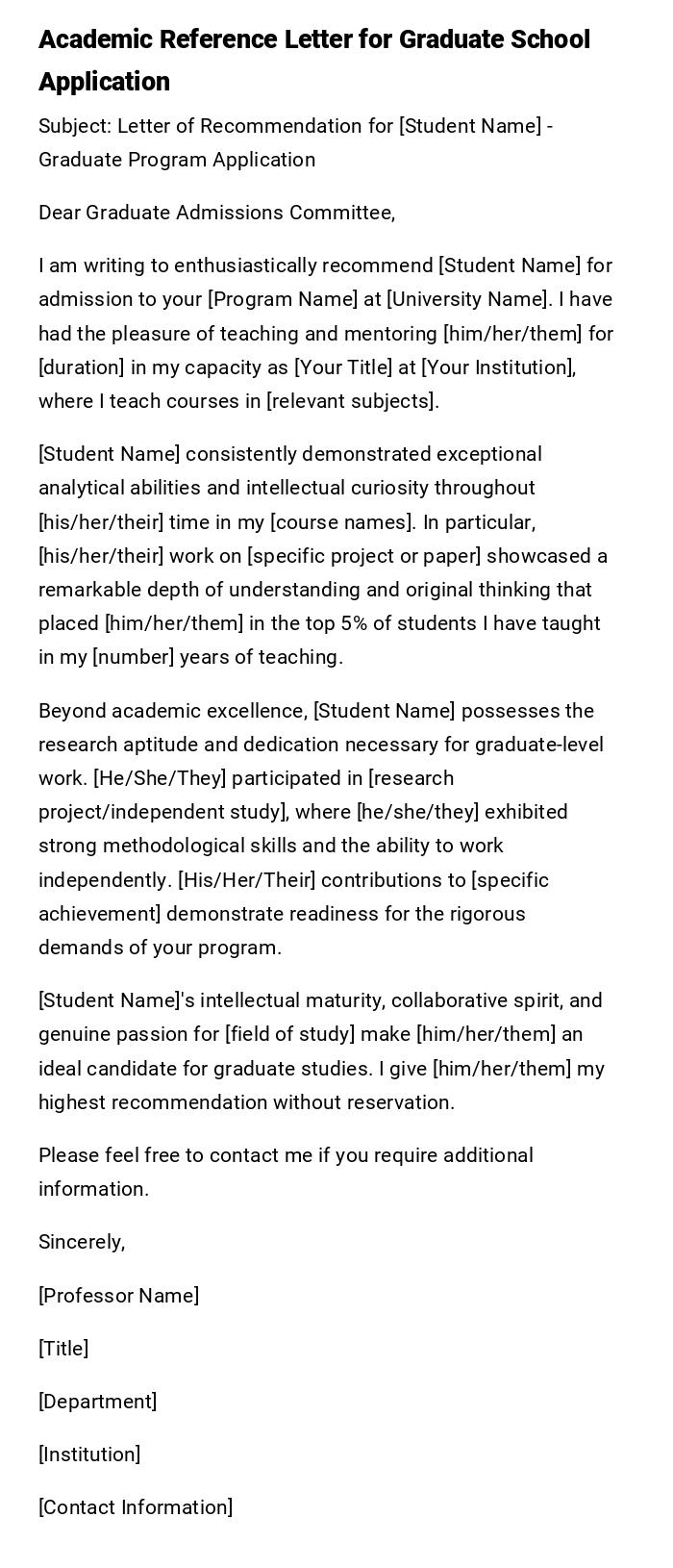
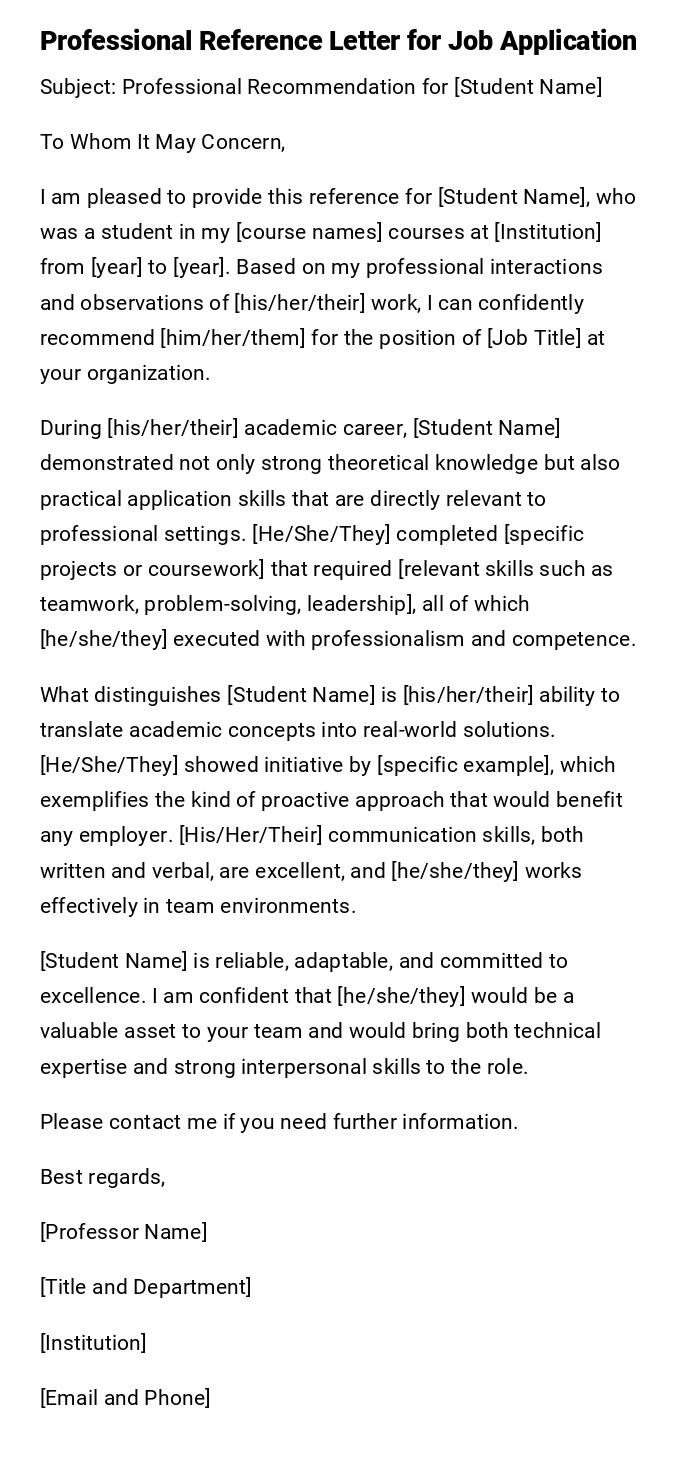
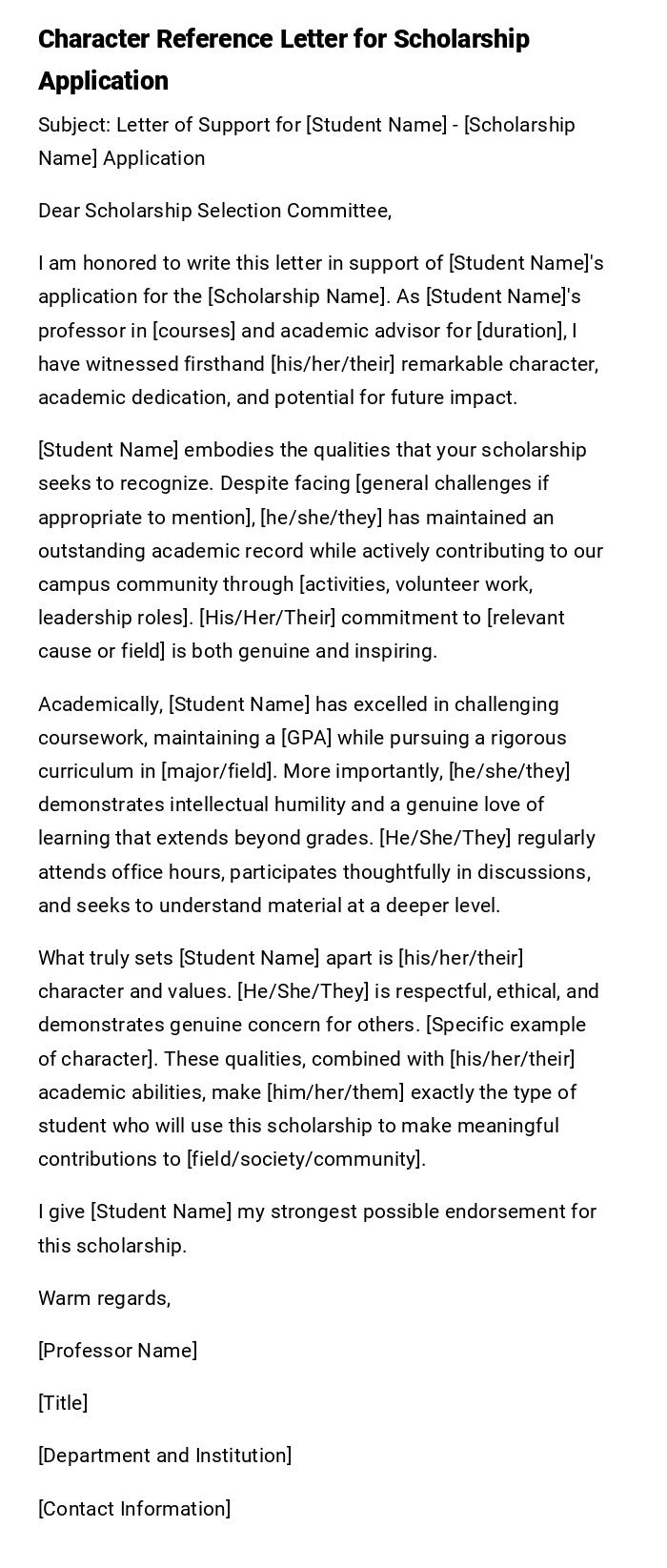
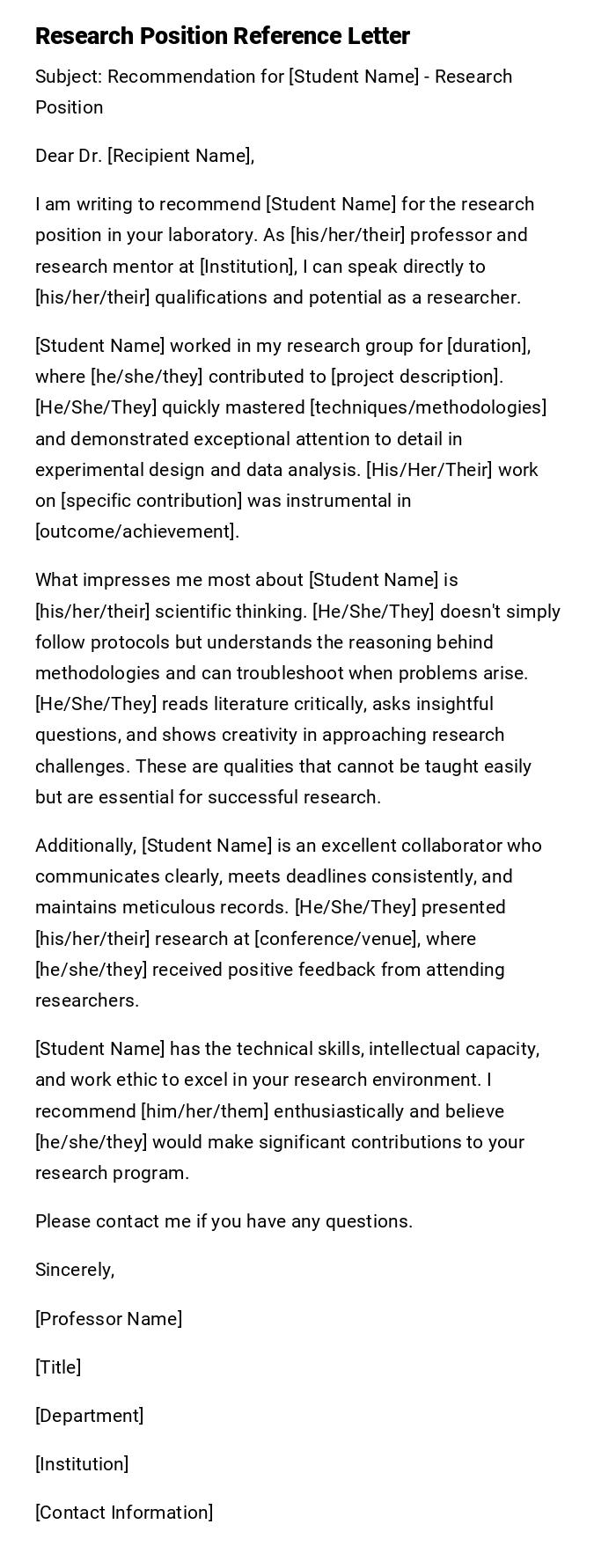
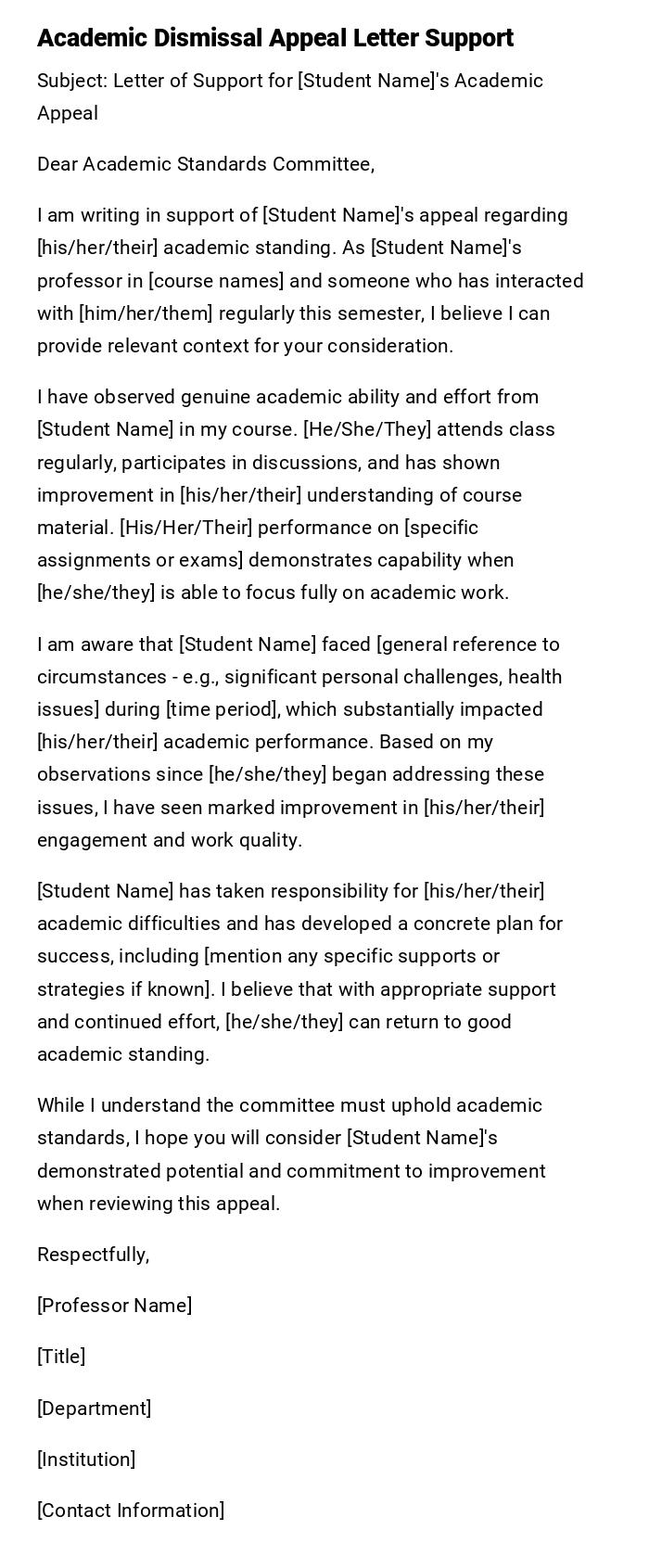
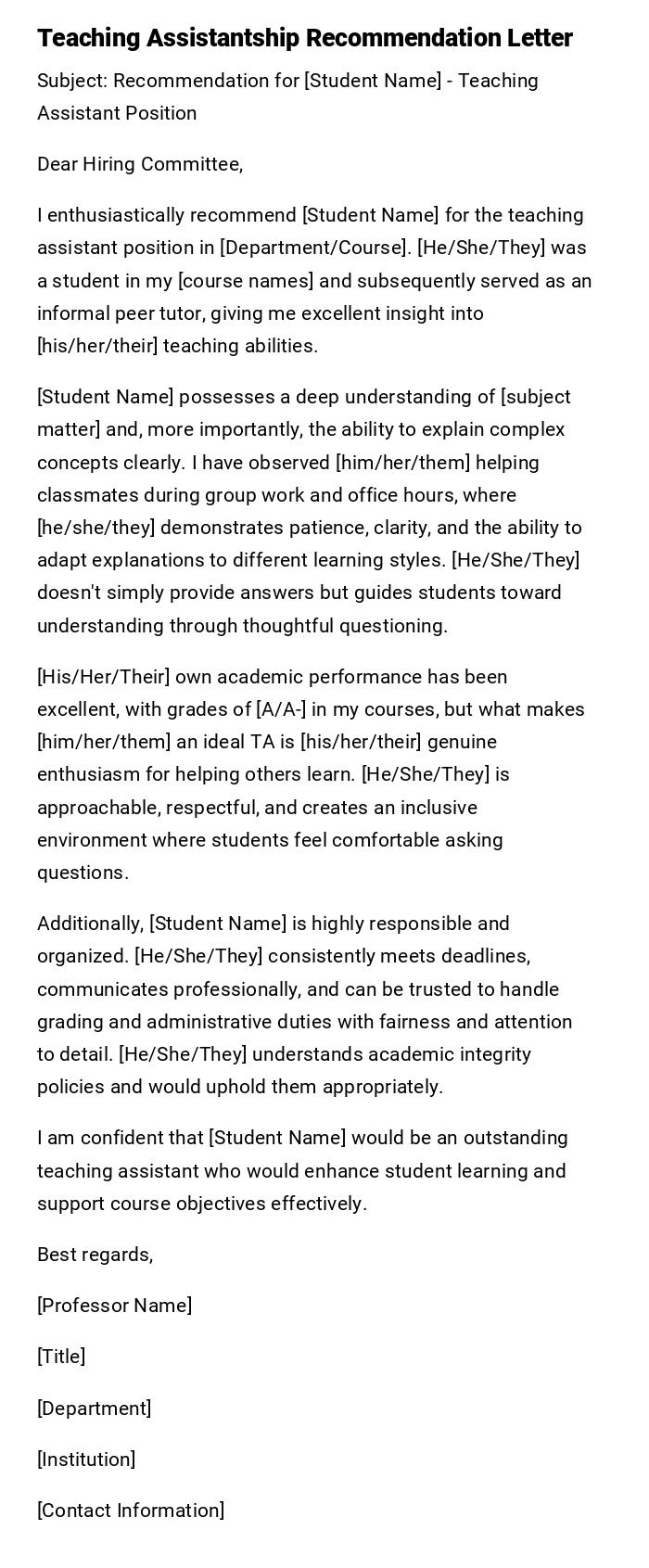
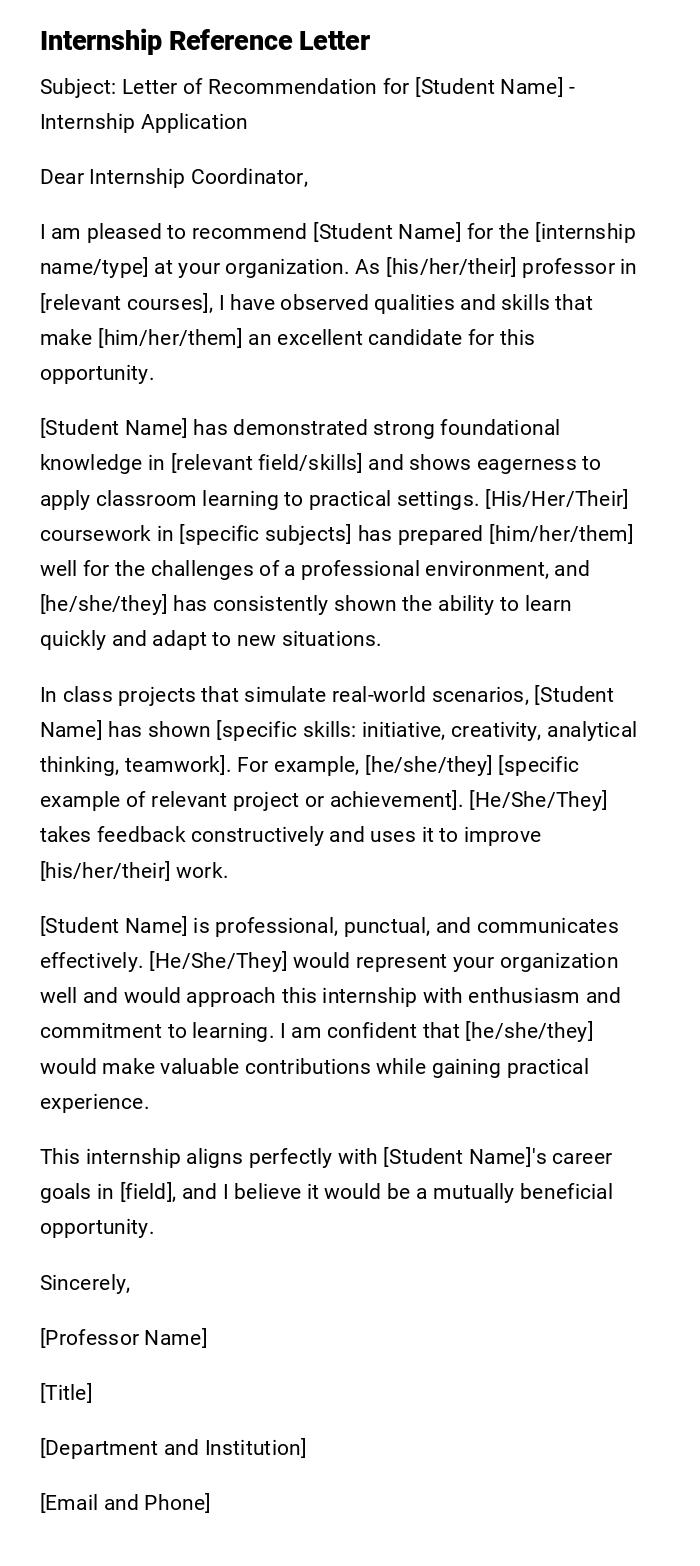
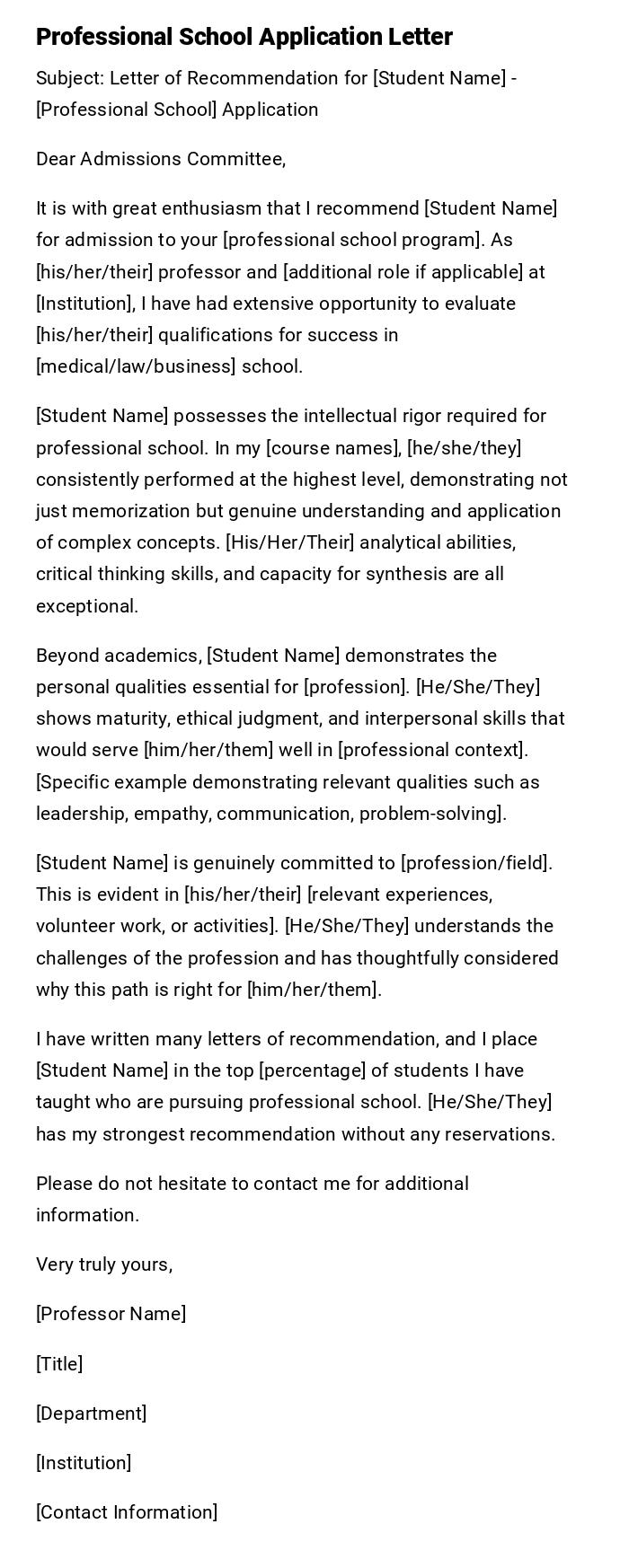

 Download Word Doc
Download Word Doc
 Download PDF
Download PDF